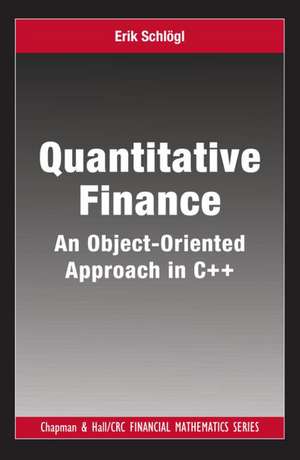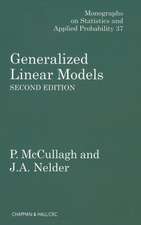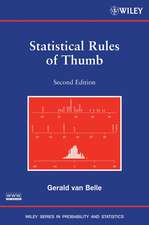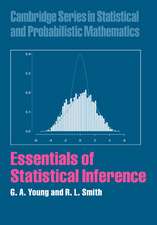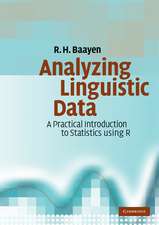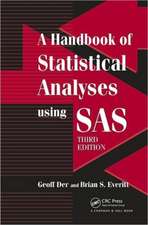Quantitative Finance: An Object-Oriented Approach in C++: Chapman and Hall/CRC Financial Mathematics Series
Autor Erik Schloglen Limba Engleză Hardback – 19 noi 2013
Through an approach based on C++ classes and templates, the text highlights the basic principles common to various methods and models while the algorithmic implementation guides readers to a more thorough, hands-on understanding. By moving beyond a purely theoretical treatment to the actual implementation of the models using C++, readers greatly enhance their career opportunities in the field.
The book also helps readers implement models in a trading or research environment. It presents recipes and extensible code building blocks for some of the most widespread methods in risk management and option pricing.
Web Resource
The author’s website provides fully functional C++ code, including additional C++ source files and examples. Although the code is used to illustrate concepts (not as a finished software product), it nevertheless compiles, runs, and deals with full, rather than toy, problems. The website also includes a suite of practical exercises for each chapter covering a range of difficulty levels and problem complexity.
Din seria Chapman and Hall/CRC Financial Mathematics Series
- 9%
 Preț: 641.09 lei
Preț: 641.09 lei - 8%
 Preț: 548.53 lei
Preț: 548.53 lei - 9%
 Preț: 731.00 lei
Preț: 731.00 lei - 8%
 Preț: 459.85 lei
Preț: 459.85 lei - 8%
 Preț: 496.01 lei
Preț: 496.01 lei - 9%
 Preț: 768.94 lei
Preț: 768.94 lei - 9%
 Preț: 704.11 lei
Preț: 704.11 lei - 9%
 Preț: 1213.55 lei
Preț: 1213.55 lei -
 Preț: 356.86 lei
Preț: 356.86 lei - 8%
 Preț: 532.05 lei
Preț: 532.05 lei -
 Preț: 342.36 lei
Preț: 342.36 lei - 9%
 Preț: 716.11 lei
Preț: 716.11 lei - 8%
 Preț: 410.54 lei
Preț: 410.54 lei - 8%
 Preț: 489.58 lei
Preț: 489.58 lei -
 Preț: 364.17 lei
Preț: 364.17 lei -
 Preț: 356.63 lei
Preț: 356.63 lei - 9%
 Preț: 833.51 lei
Preț: 833.51 lei - 9%
 Preț: 620.14 lei
Preț: 620.14 lei - 9%
 Preț: 595.34 lei
Preț: 595.34 lei - 8%
 Preț: 375.01 lei
Preț: 375.01 lei - 9%
 Preț: 574.56 lei
Preț: 574.56 lei -
 Preț: 403.11 lei
Preț: 403.11 lei - 30%
 Preț: 1014.74 lei
Preț: 1014.74 lei -
 Preț: 456.76 lei
Preț: 456.76 lei -
 Preț: 436.14 lei
Preț: 436.14 lei - 13%
 Preț: 310.44 lei
Preț: 310.44 lei - 26%
 Preț: 1014.74 lei
Preț: 1014.74 lei - 12%
 Preț: 312.43 lei
Preț: 312.43 lei - 15%
 Preț: 599.94 lei
Preț: 599.94 lei - 18%
 Preț: 783.69 lei
Preț: 783.69 lei - 15%
 Preț: 570.70 lei
Preț: 570.70 lei - 8%
 Preț: 547.38 lei
Preț: 547.38 lei - 18%
 Preț: 793.01 lei
Preț: 793.01 lei - 24%
 Preț: 900.85 lei
Preț: 900.85 lei - 18%
 Preț: 1280.44 lei
Preț: 1280.44 lei - 9%
 Preț: 608.33 lei
Preț: 608.33 lei - 22%
 Preț: 371.11 lei
Preț: 371.11 lei - 20%
 Preț: 508.40 lei
Preț: 508.40 lei - 26%
 Preț: 763.78 lei
Preț: 763.78 lei - 20%
 Preț: 1288.30 lei
Preț: 1288.30 lei - 28%
 Preț: 1438.38 lei
Preț: 1438.38 lei
Preț: 679.76 lei
Preț vechi: 799.72 lei
-15% Nou
Puncte Express: 1020
Preț estimativ în valută:
130.07€ • 136.15$ • 108.26£
130.07€ • 136.15$ • 108.26£
Carte tipărită la comandă
Livrare economică 31 martie-14 aprilie
Preluare comenzi: 021 569.72.76
Specificații
ISBN-13: 9781584884798
ISBN-10: 1584884797
Pagini: 354
Ilustrații: 30 black & white illustrations, 27 black & white tables
Dimensiuni: 156 x 234 x 28 mm
Greutate: 0.73 kg
Ediția:1
Editura: CRC Press
Colecția Chapman and Hall/CRC
Seria Chapman and Hall/CRC Financial Mathematics Series
Locul publicării:Boca Raton, United States
ISBN-10: 1584884797
Pagini: 354
Ilustrații: 30 black & white illustrations, 27 black & white tables
Dimensiuni: 156 x 234 x 28 mm
Greutate: 0.73 kg
Ediția:1
Editura: CRC Press
Colecția Chapman and Hall/CRC
Seria Chapman and Hall/CRC Financial Mathematics Series
Locul publicării:Boca Raton, United States
Public țintă
UndergraduateCuprins
A Brief Review of the C++ Programming Language. Basic Building Blocks. Lattice Models for Option Pricing. The Black/Scholes World. Finite Difference Methods. Implied Volatility and Volatility Smiles. Monte Carlo Simulation. The Heath/Jarrow/Morton Model. Appendices. References. Index.
Notă biografică
Erik Schlögl currently is Professor and Director of the Quantitative Finance Research Centre at the University of Technology, Sydney (UTS), Australia. Erik received his doctorate in Economics from the University of Bonn, Germany, for work on term structure models and the pricing of fixed income derivatives and has gained broad-based experience in computational financial engineering. He has consulted for financial institutions and software developers in Europe, Australia and in the US. His research interests cover a broad area of quantitative finance, in particular model calibration, interest rate term structure modelling, credit risk and the integration of multiple sources of risk. He has published articles in a number of international journals, including Finance & Stochastics, Quantitative Finance, Risk and the Journal of Economic Dynamics and Control. In addition to UTS, he held positions at the University of New South Wales, Australia, and the University of Bonn, Germany.
Recenzii
"… a comprehensive, dual-perspective introduction to quantitative finance methods. By providing implementation details alongside theory, Schlögl ensures that one is never overemphasized at the expense of the other. All of the code described is reusable and reliant on only a small number of external libraries, meaning that this book is an invaluable resource to students and professionals in the field alike."
—Computing Reviews, March 2015
"I recommend Erik Schlogl’s new book to all those interested in model implementation. From quasi-random sequences to HJM to the Excel interface, with full C++ code, there is something here for everyone."
—Jim Gatheral, Presidential Professor, Baruch College, CUNY
"If 25 years ago I had started in finance using C instead of Visual Basic, perhaps now I might be approximating Prof. Schlogl’s balanced and professional C++ framework for pricing financial derivatives. From interacting with quants writing production code I have learnt that several years’ experience with C++ can be dangerous as the possibility of writing incomprehensible (to others) abstract code becomes attractive. In this respect Prof. Schlogl strikes just the right balance between using the full power of C++ to encapsulate, concentrate, and abstract code, while remaining comprehensible. His book thoroughly outlines a framework, including procedures and libraries, for constructing the various building blocks of pricing systems for financial derivatives. Users implementing his sort of framework can be confident their code will be understood, and that it can be maintained and revised without dating. It is one of the dozen or so books that ought to be on every financial quant’s bookshelf; if only I had had it earlier!"
—Alan Brace, Senior Quantitative Analyst in Market Risk, National Australia Bank, and Adjunct Professor, Quantitative Finance Research Centre, University Technology of Sydney
"While some view quantitative finance as just another playground for beautiful mathematical theories, it is ultimately a very practical discipline where one’s success is more often than not measured by the quality, speed, and accuracy of computer code written to solve real-world problems. Quantitative Finance: An Object-Oriented Approach in C++ embraces this pragmatic view wholeheartedly to great success. The three core competencies of a successful quant: firm grasp of theory, strong command of numerical methods, and software design and development skills are taught in parallel, inseparable in the book as they are in the real world. A fantastic resource for students looking to become quants, the book sets a standard on how practically relevant quantitative finance should be taught. Those already in the field will also no doubt learn a thing or two on how to represent common financial constructs as logical and reusable software components."
—Vladimir V. Piterbarg, Head of Quantitative Analytics, Barclays
"Students and practitioners of quantitative analysis have long wanted a detailed exposition of computational finance that includes implementation details and quality C++ code. Their desires are no longer unrequited—this book contains a clear and careful discussion of many of the key derivatives pricing models together with object-oriented C++ code. Substantial discussion of the design choices made is also included. I believe that this book is destined to be part of every financial engineer’s toolkit."
—Professor Mark Joshi, University of Melbourne
—Computing Reviews, March 2015
"I recommend Erik Schlogl’s new book to all those interested in model implementation. From quasi-random sequences to HJM to the Excel interface, with full C++ code, there is something here for everyone."
—Jim Gatheral, Presidential Professor, Baruch College, CUNY
"If 25 years ago I had started in finance using C instead of Visual Basic, perhaps now I might be approximating Prof. Schlogl’s balanced and professional C++ framework for pricing financial derivatives. From interacting with quants writing production code I have learnt that several years’ experience with C++ can be dangerous as the possibility of writing incomprehensible (to others) abstract code becomes attractive. In this respect Prof. Schlogl strikes just the right balance between using the full power of C++ to encapsulate, concentrate, and abstract code, while remaining comprehensible. His book thoroughly outlines a framework, including procedures and libraries, for constructing the various building blocks of pricing systems for financial derivatives. Users implementing his sort of framework can be confident their code will be understood, and that it can be maintained and revised without dating. It is one of the dozen or so books that ought to be on every financial quant’s bookshelf; if only I had had it earlier!"
—Alan Brace, Senior Quantitative Analyst in Market Risk, National Australia Bank, and Adjunct Professor, Quantitative Finance Research Centre, University Technology of Sydney
"While some view quantitative finance as just another playground for beautiful mathematical theories, it is ultimately a very practical discipline where one’s success is more often than not measured by the quality, speed, and accuracy of computer code written to solve real-world problems. Quantitative Finance: An Object-Oriented Approach in C++ embraces this pragmatic view wholeheartedly to great success. The three core competencies of a successful quant: firm grasp of theory, strong command of numerical methods, and software design and development skills are taught in parallel, inseparable in the book as they are in the real world. A fantastic resource for students looking to become quants, the book sets a standard on how practically relevant quantitative finance should be taught. Those already in the field will also no doubt learn a thing or two on how to represent common financial constructs as logical and reusable software components."
—Vladimir V. Piterbarg, Head of Quantitative Analytics, Barclays
"Students and practitioners of quantitative analysis have long wanted a detailed exposition of computational finance that includes implementation details and quality C++ code. Their desires are no longer unrequited—this book contains a clear and careful discussion of many of the key derivatives pricing models together with object-oriented C++ code. Substantial discussion of the design choices made is also included. I believe that this book is destined to be part of every financial engineer’s toolkit."
—Professor Mark Joshi, University of Melbourne
Descriere
This text provides readers with a foundation in the key methods and models of quantitative finance. Through an approach based on C++ classes and templates, the text highlights the basic principles common to various methods and models while the algorithmic implementation guides readers to a more thorough, hands-on understanding. It also presents recipes and extensible code building blocks for some of the most widespread methods in risk management and option pricing. C++ code and other materials are available on the author’s website.
